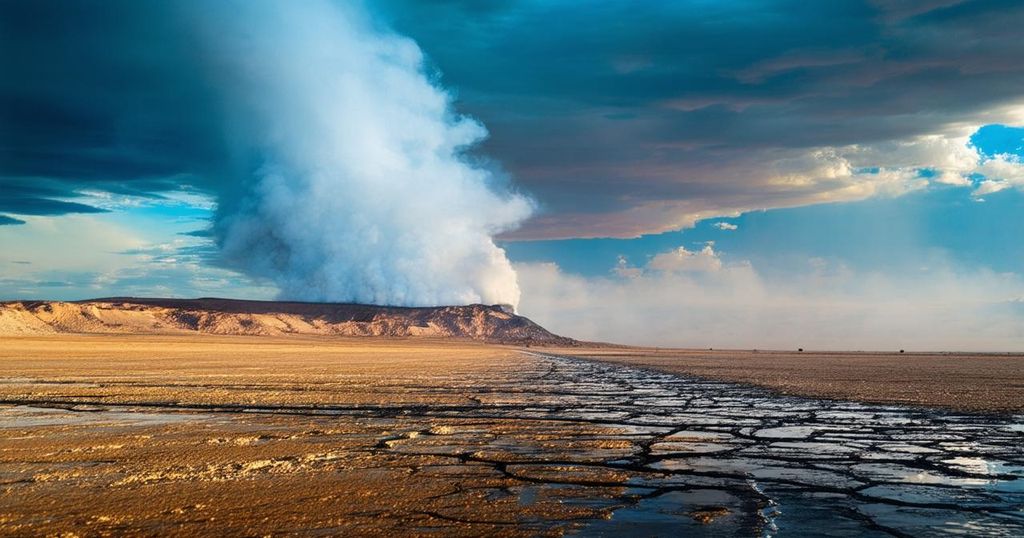The UN warns that the world is on course for a disastrous global temperature rise of 3.1 degrees Celsius by the century’s end unless massive efforts are undertaken to reduce emissions. The UNEP’s recent report highlights a troubling gap between necessary emissions cuts and current country efforts, with emissions increasing by 1.3% in 2023. Unless nations strengthen their climate commitments leading into the upcoming Cop29 talks, the goal of limiting global warming to 1.5 degrees Celsius may soon be out of reach.
The United Nations has issued a dire warning regarding global warming, indicating that the world is currently on trajectory towards a calamitous increase of 3.1 degrees Celsius this century unless there is a dramatic shift in emissions reduction efforts. In its latest report, the UN Environment Programme (UNEP) highlighted the widening gap between required emissions cuts to adhere to the target of limiting warming to 1.5 degrees Celsius and the actions that nations are currently undertaking. Without urgent and large-scale mobilization to slash climate emissions, the goal of maintaining temperature rises below 2 degrees Celsius is in peril. The report estimates that, based on present commitments and actions, global temperatures could rise between 2.6 to 3.1 degrees Celsius, underscoring the critical need for nations to strengthen their climate strategies leading up to the Cop29 talks set to take place in Baku, Azerbaijan. Since the Paris Agreement in 2015, a consensus was reached to aim for a maximum increase of 2 degrees Celsius, with efforts to maintain the increase at 1.5 degrees Celsius above pre-industrial levels. Scientists warn that exceeding this threshold would precipitate catastrophic consequences, including severe heatwaves, droughts, floods, and destabilized ecosystems. Despite country-specific action plans outlined to meet these targets, the UNEP has expressed concern that the collective global response is faltering. In 2023, greenhouse gas emissions saw an increase of 1.3% compared to 2022, primarily driven by the G20 nations, which contribute approximately three-quarters of global emissions. Even with a full realization of current climate pledges, the world is projected to experience a temperature rise of 2.6 to 2.8 degrees Celsius. UN Secretary General Antonio Guterres remarked on the precarious situation, stating, “Either leaders bridge the emissions gap, or we plunge headlong into climate disaster – with the poorest and most vulnerable suffering the most.” He emphasized the urgent need for governments to commit to drastic reductions in greenhouse gases, transition away from fossil fuels, and enhance financial support for developing nations to adequately address climate challenges. Likewise, Inger Andersen, the executive director of UNEP, declared, “Climate crunch time is here. We need global mobilisation on a scale and pace never seen before – starting right now, before the next round of climate pledges – or the 1.5C goal will soon be dead.” She further accentuated the importance of collective action and ambitious plans for the upcoming COP to align with a 1.5-degree Celsius pathway, stressing that every fraction of a degree matters in mitigating the impacts of climate change. The necessity for countries to pledge to reduce greenhouse gas emissions by 42% by 2030 and 57% by 2035 is imperative for achieving the 1.5-degree Celsius target. The route to successful climate action involves a significant increase in renewable energy, improved energy efficiency, and preservation of natural habitats, according to UNEP’s analysis. The urgency of transforming global emission patterns is further underscored by remarks from UK Energy Secretary Ed Miliband, who noted the potential benefits of renewable energy investments on both economic and environmental fronts. Thus, a unified, concerted effort is paramount to avert a climate crisis that threatens future generations.
The increasing threat of global warming and climate change is a pressing issue recognized by global leaders, scientists, and organizations such as the United Nations. As articulated in the Paris Agreement of 2015, the global community has acknowledged the critical need to limit the rise in global temperatures to well below 2 degrees Celsius, with a target of 1.5 degrees Celsius to avoid catastrophic impacts. However, reports suggest that current policies are inadequate, leading to fears that these goals may soon be out of reach. The UNEP’s annual report evaluates the effectiveness of national commitments to reducing greenhouse gas emissions and underscores the urgent need for collaborative action to mitigate climate change effects, particularly ahead of key international climate negotiations.
In summary, the UN’s alarming assessment highlights the urgent need for concerted global action to prevent catastrophic climate change. The current trajectory is alarming, with predictions of a temperature rise between 2.6 to 3.1 degrees Celsius unless significant steps are implemented to bridge the gaps in emissions cuts. The calls from both Guterres and Andersen emphasize that without immediate action at the forthcoming Cop29, the vital goal of limiting climate change to 1.5 degrees Celsius could soon become unattainable, impacting future generations and the planet’s ecosystems.
Original Source: www.independent.co.uk







